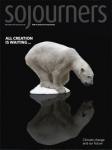We are not to picture Jesus as a modern baby lying with nothing on but a diaper ... but as a baby in “swaddling cloths,” the long narrow strips of bandage wrapped round his limbs and body and making free movement impossible ... Is it not almost unbelievable that the Creator, on whose freedom and power we all depend, should allow himself to be bound, and to lie in helpless weakness in the straw?
Paul says that he “emptied himself,” not of course of his deity but of his glory ... He “took the form of a servant.” He made himself vulnerable. And now his mind is to be in us. For we are to empty ourselves and to humble ourselves. Of course we cling to power. We like to “make friends and influence people,” to exert our authority, to boss our subordinates and to throw our weight about. It all feeds our ego, boosts our morale, protects our threatened security. Too often down the ages the church has been power-hungry, marked more by authority than by weakness, more by self-assertion than by self-sacrifice. “But it shall not be so among you,” Jesus had said.
The incarnation challenges us to acknowledge the values and standards of Jesus, and to assert that love is stronger than force. He was born naked, defenseless, vulnerable. Why should the disciple wish to be different from the teacher? Too often we rely on the power of the world to get our own way. But he emptied himself. So must we.
John R.W. Stott was a rector in London and a Sojourners contributing editor when this article appeared.

Got something to say about what you're reading? We value your feedback!